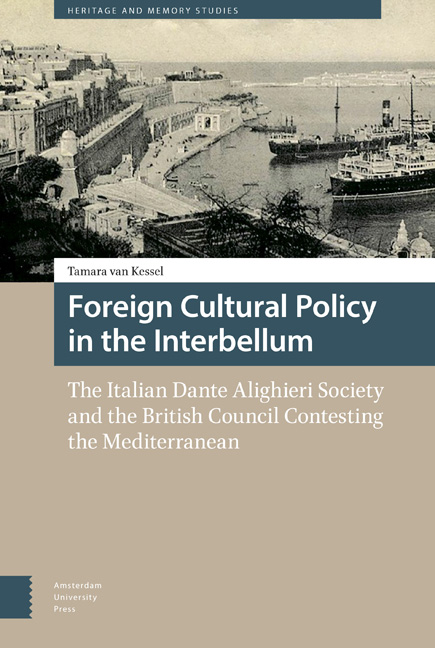 Foreign Cultural Policy in the Interbellum
Foreign Cultural Policy in the Interbellum Book contents
- Frontmatter
- Contents
- List of Illustrations
- Introduction
- 1 The Development of Foreign Cultural Policy
- 2 The Dante Alighieri Society and the British Council: Agency and Independence
- 3 Constructions of ‘Italianità’ and ‘Britishness’
- 4 The Battle for Cultural Hegemony in Malta
- 5 National Culture and Imperial Conquest: The Dante Alighieri Society in Abyssinia and the British Council in Egypt
- Conclusion
- Acknowledgements
- Bibliography
- Index
2 - The Dante Alighieri Society and the British Council: Agency and Independence
Published online by Cambridge University Press: 12 February 2021
- Frontmatter
- Contents
- List of Illustrations
- Introduction
- 1 The Development of Foreign Cultural Policy
- 2 The Dante Alighieri Society and the British Council: Agency and Independence
- 3 Constructions of ‘Italianità’ and ‘Britishness’
- 4 The Battle for Cultural Hegemony in Malta
- 5 National Culture and Imperial Conquest: The Dante Alighieri Society in Abyssinia and the British Council in Egypt
- Conclusion
- Acknowledgements
- Bibliography
- Index
Summary
The notions of Italian and British culture presented by the Dante Alighieri Society and the British Council respectively depended on who was operating within these organizations and what their relationship was with the state. This chapter takes a closer look at these two rival organizations. Far from providing an exhaustive and detailed description of their administrative and operational structure, the aim is to concentrate on two particular aspects. First, how did these organizations relate to the state they were functioning in? In the interbellum, the Dante had to adjust to an authoritarian government, while the Council was presented as an independent body in a liberal and democratic state. How did this work in practice? Second, who were the people at the head of the Dante and the Council in this period, and what were their professional, political, and social backgrounds? This latter question is obviously related to the first. It goes further, however, by delving into the governmental and individual motives that inspired these key players, and by recognizing the significance of individual agency. This provides important background information for the next chapter, which looks into what kind of cultural heritage these two organizations promoted.
In the case of the Dante, the Risorgimento ideals that had stood central to the organization determined what type of persons supported it and to what extent it could adapt to the Fascist regime. To begin with, the social groups engaged in the Dante's activities belonged to those layers of Italian society that benefited from the position they had in a unified Italy, such as politicians, civil servants, and teachers. At the same time, these groups were part of a national, educated upper class that still showed significant regional differences; their heterogeneity made it harder to attach concrete values or institutions to the notion of italianità. Hence there was a tendency to opt for abstract ideals, for Risorgimento icons, the shared Ancient Roman past, and eventually the new future promised by Italian Fascism. The Dante Alighieri Society – and the idealizing rhetoric of the Risorgimento with which the Society was so closely connected – came to be associated by some with a political establishment that was being held back by a glorification of the past.
- Type
- Chapter
- Information
- Foreign Cultural Policy in the InterbellumThe Italian Dante Alighieri Society and the British Council Contesting the Mediterranean, pp. 61 - 100Publisher: Amsterdam University PressPrint publication year: 2016


